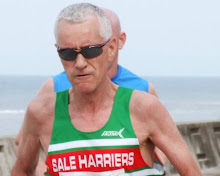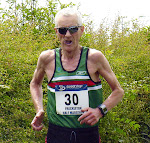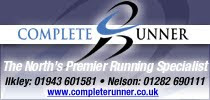
If you are using a crystal ball to predict your race times perhaps it's time to consult one of the many running websites or running publications which might be a bit more accurate. Having said that you could consult several such means and come up with several differing results. I have always put most faith in an old Competitor's Runner's Handbook by Bob Glover. According to that a 20.30 5K predicts to 1:35 for half marathon. But in his later edition a 20.35 5K , my recent Alex Park 5K time, predicts to 1:33.44. Taking the first, yesterday's time was 16 seconds under target; but taking the second it was 1 minute down!
I referred to the first book when giving myself a target time for the Blackpool half and ran within a second per mile of the predicted target pace. Fine. I should be pleased all things considered, I suppose.
But what if I had used the later edition forecasting 93.44, would I have upped my pace from 7.15 to 7.09 to run "as predicted". Did having a predicted time in mind put a brake on my efforts such that in the end the performance was just a self fulfilling prophecy?
The results show that the runners in the group at 5 miles finished up to 8 minutes behind by the end. Perhaps that first lap was too slow. Without a predicted time in mind or even running without the garmin and stopwatch would I have run less inhibited and done a better time? The 19 year student I raced the second lap with yesterday told me at 7 miles his best was 1:43. I made it very clear he was on for 1:35. He was not phased by this at all. He obviously had no "predicted" time in mind. He just knew that a grey haired (OK I had my hat on) wiry legged old man was not going to beat him whatever time it took him to. He fully deserved his great new P.B.
Of course, as far as the age group went, the discussion is purely academic as Mike McKenna beat me by 10 minutes to win the M60 category. But then again he does top the UK rankings.
Whichever prediction chart you refer to I think they work at their very best when viewed from the consideration of the time for the longest distance and working down to the shorter distances. So a 3.00 marathoner is highly likely to be able to run a 40.00 minute 10K but a 40 minute 10k runner is not going to run a 3.00 marathon unless he has trained for a marathon. Quite clearly just because Usain Bolt can jog 100 metres in under 10 seconds doesn't mean he is going to run 1: 40 for a marathon.
 In conclusion, whilst it's tempting to leave your garmin in the car or your watch in your kit bag the majority of us prefer to have a predicted time in mind and this helps dictate our racing plan. Bob Glover devotes 11 pages to the matter and publishes separate male and female charts. He states that "Goal setting is one of the most powerful tools any runner can use to improve performance". Fine, but I would suggest the most significant P.Bs come when the spirit of competition is so fierce that you don't time or inclination to keep looking at your watch... you are just intent on not being beaten!
In conclusion, whilst it's tempting to leave your garmin in the car or your watch in your kit bag the majority of us prefer to have a predicted time in mind and this helps dictate our racing plan. Bob Glover devotes 11 pages to the matter and publishes separate male and female charts. He states that "Goal setting is one of the most powerful tools any runner can use to improve performance". Fine, but I would suggest the most significant P.Bs come when the spirit of competition is so fierce that you don't time or inclination to keep looking at your watch... you are just intent on not being beaten!









I totally agree with the conclusions Terry. If race times were so predictable I am sure it would make it totally boring anyway. Excluding the long distance races(marathons etc), where using a watch and holding back on the pace is needed, I think most competitive runners are trying to dig deep, run to their max, beat their rivals and achieve the best time they can. The spirit of competition on the day, inner mental strength and fear of getting beat I don't think can ever be measured by a chart. This is probably why there is such differences in the predictions.
ReplyDelete